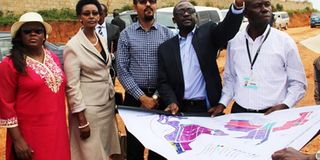Development must not disregard environment - UN envoy

Left to right: UNDP Resident Representative Rosa Malango, UIA executive director Jolly Kaguhangire and minister and special advisor to the Prime Minister of Ethiopia Arkebe Oqubay are taken through the physical plan of the Kampala Industrial and Business Park by UIA officials in Namanve, last week. COURTSEY PHOTO
What you need to know:
UNDP supported Uganda publish a wetlands atlas, detailing location and status of all wetlands, with a version for schools so that their location and importance is learned in education institutions.
According to the Resident Representative, Ms Rosa Malango, UNDP would also support the Presidential Initiative for Wetlands that will help to accelerate the delivery of a comprehensive response including relocation of people in wetlands and help them learn new skills and livelihoods.
Kampala. Uganda’s drive to industrialise must not be at the expense of the environment, a United Nations envoy has said.
The United Nations Development Programme (UNDP) Resident Representative, Ms Rosa Malango, who is also the United Nations Resident Coordinator, has said inclusive green growth is the pathway to sustainable development.
“Any investor who comes to Uganda should know where wetlands are and the laws that govern them,” Ms Malango, said.
The envoy said UNDP supported Uganda to publish a wetlands atlas, detailing location and status of all wetlands, with a version for schools so that their location and importance is learned in education institutions.
She said UNDP would also support the Presidential Initiative for Wetlands that will help to accelerate the delivery of a comprehensive response including relocation of people in wetlands and help them learn new skills and livelihoods.
“We have supported Uganda Mineral Resources Management Project; We want to ensure that oil exploration doesn’t undermine the environment,” Ms Malango said.
She said this while on a guided tour of the Kampala Industrial and Business Park in Namanve, last week.
Ms Rosa Malango, who was together with Dr Arkebe Oqubay, the minister and special advisor to the Prime Minister of Ethiopia at Namanve. Dr Arkebe, was in Uganda at the invitation of UNDP as a key note speaker at the High-Level Dialogue on the country’s economy.
On her part, the new Uganda Investment Authority (UIA) chief executive officer Ms Jolly Kaguhangire, said: “At full capacity, this industrial park will become the biggest industrial hub in Uganda will 296 industries, directly employing 200,000 Ugandans.”
“The industries in the park alone will be contributing over $540 million in taxes per annum at full capacity,” Ms Kaguhangire added in a report presented on her behalf by Mr Hamza Galiwango, the UIA director for land development division.
More funding
The UIA officials, however, asked government to inject $151 million (Shs500 billion) which will be utilised for infrastructure development and help the park operate optimally.
The money is needed to upgrade the industrial roads to bituminous standards, provide high voltage powerlines (132Kv) provide industrial water supply, install fibre optic for Internet, sewerage plant and waste management.
The 2200-acre industrial park is located partly in Wakiso and Mukono districts. According to Mr Galiwango all the land in the industrial park has been allocated to 296 prospective investors for development. Of these 21 industries are operational employing 11,000 Ugandans within the park while 70 companies are under construction and 150 are processing paper work, he explained.
Sharing some of the strategies Ethiopia has under taken to industrialise, Dr Arkebe asked UIA to prioritise the export industries and treat them differently. He also proposed that incentives differ sector by sector.
“Incentives are sweeteners but not a criterion. The best criterion is the cost of doing business; market access, infrastructure, government support and stability,” Dr Arkebe explained.
The Ethiopian minister noted that there should be established a one-stop-centre in the industrial park with all business-related offices and services like; logistics, banking, insurance, water supply, power connection and registration of businesses. In Ethiopia, he said, visas are issued within the industrial park.
“Time is critical. This place (Namanve) was designated as an industrial park in 1997. After 20 years, situations change and you lose opportunities,” Dr Akerbe said.
The minister asked UIA to plan for waste management. “Now that you are in a wetland, you might need to think about the impact in the long term. You will find it quite damaging. The option we have chosen (in Ethiopia) is to be strict; zero discharge technology.”




